
The variable checkerspot or Chalcedon checkerspot is a butterfly in the family Nymphalidae. It is found in western North America, where its range stretches from Alaska in the north to Baja California in the south and extends east through the Rocky Mountains into Colorado, Montana, New Mexico and Wyoming. The butterfly is usually brown or black with extensive white and yellow checkering and some red coloration on the dorsal wing. Adult wingspan is 3.2–5.7 cm (1.3–2.2 in). Adult butterflies feed on nectar from flowers while larvae feed on a variety of plants including snowberry (Symphoricarpos), paintbrush (Castilleja), Buddleja, Diplacus aurantiacus and Scrophularia californica.

Chlosyne gorgone, the gorgone checkerspot, is a species of Nymphalinae butterfly that occurs in North America.
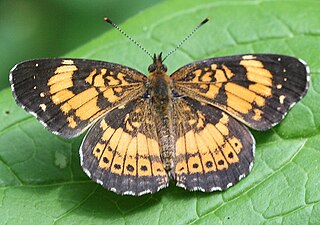
Chlosyne nycteis, the silvery checkerspot, is a species of Nymphalinae butterfly that occurs in North America. It is listed as a species of special concern in Connecticut and Maine, and is believed extirpated in Connecticut, Massachusetts, and New Hampshire.
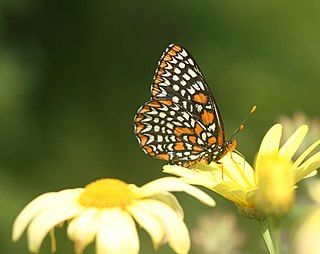
The Baltimore checkerspot is a North American butterfly of the family Nymphalidae. It has been the official state insect of the U.S. State of Maryland since 1973. The Baltimore checkerspot was named for the first Lord Baltimore due to its similarity of colors in the family crest. Despite the species status as Maryland state insect, the population in Maryland has faced significant decline and is currently listed by the Maryland Department of Natural Resources as "rare, threatened, and endangered" animal list.

Chlosyne is a genus of butterflies from North and South America in the family Nymphalidae.

Chlosyne harrisii, or Harris's checkerspot, is a member of the family Nymphalidae that is found in North America. They range from the Canadian Atlantic provinces, excluding Newfoundland and Labrador, to Manitoba and North Dakota south to West Virginia and Ohio. They can often be seen in bogs, meadows and almost anywhere else its host plant occurs. The typical elevations for this species range from 0 to 1,742 feet (531 m). It is listed as a species of special concern and believed extirpated in the US state of Connecticut.

Texola elada, the Elada checkerspot, is a species of butterfly in the brush-footed butterfly family, Nymphalidae. It is found from southern Mexico north to central Texas and central Arizona in the United States.

Chlosyne palla, the northern checkerspot, is a butterfly of the family Nymphalidae that is found in North America. They range from southern British Columbia to Alberta, south to California, Utah, and Colorado, excluding Nevada.

Chlosyne acastus, the sagebrush checkerspot, is a butterfly of the family Nymphalidae that is found in North America. They range from western United States east to Nebraska and north to southern Alberta.

Chlosyne hoffmanni, or Hoffmann's checkerspot, is a butterfly of the family Nymphalidae that is found in western North America. They range from the Sierra Nevada and Cascade Mountains in the U.S. to Manning Park in British Columbia.
Chlosyne whitneyi damoetas, the rockslide checkerspot, is a butterfly of the family Nymphalidae that is found in North America, from British Columbia and Alberta to Wyoming and Colorado.

Chlosyne ehrenbergii, the white-rayed checkerspot, white-rayed patch or Ehrenberg's patch, is a butterfly of the family Nymphalidae. It is found in Mexico.
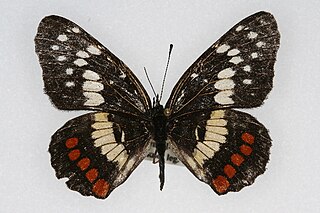
Chlosyne marina, the red-spotted patch or marina checkerspot, is a butterfly of the family Nymphalidae. It is found in Mexico. Rare strays can be found as far north as southern Arizona and southern Texas.

Chlosyne fulvia, the Fulvia checkerspot, is a butterfly of the family Nymphalidae. It is found in North America from Kansas, Colorado, southern Utah and Arizona south to central Mexico.

Chlosyne leanira, the leanira checkerspot, is a butterfly of the family Nymphalidae. It is found in North America from western Oregon south to California, Nevada, Utah and western Colorado, as well as Baja California. The wingspan is 33–40 mm. Generally, females are larger than males, but males have a more apparent red color to their wings.
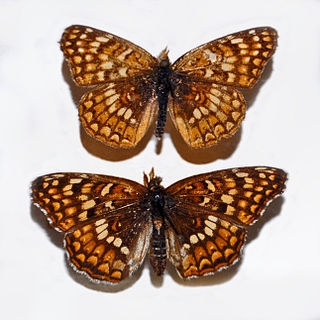
Chlosyne gabbii, or Gabb's checkerspot, is a butterfly from the family Nymphalidae.

Chlosyne definita, known generally as the definite patch or definite checkerspot, is a species of checkerspot in the family Nymphalidae. It is found in North America.
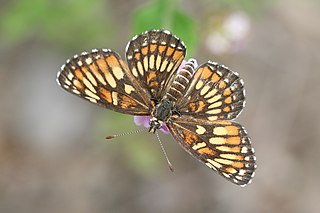
Chlosyne theona, the theona checkerspot, is a species checkerspots in the butterfly family Nymphalidae found in North America. The MONA or Hodges number for C. theona is 4508.
















